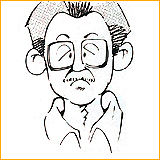| Mental Health Tips | |
| Common Mental Problems | |
| Substance Misuse | |
| Treatment of Mental Disorders | |
| Mental Health Education Pamphlets | |
 Elderly depression
Elderly depression
(Special thanks to Dr. Mimi Wong of Institute of Mental Health, Castle Peak Hospital, for authoring this article)
Depression is one of the commonest psychiatric disorders in old age and yet it is frequently underdetected and under-treated. The fact that loss is common in this particular stage of lift often leads to the notion that the presence of depressive symptoms is somehow understandable and “normal” in old age. This often results in delay in treatment. Depression in elderly people is a highly treatable illness and its prognosis is at least as good as depression presenting in younger age groups. If you notice that the unhappy feelings last longer than a week or two, and they start to interfere with your lives, you need to be careful and to seek help as soon as possible.
1. What is elderly depression?
2. What are the causes of elderly depression?
3. What are the symptoms of elderly depression?
4. Why it is more difficult to diagnose depression in elderly?
5. How to investigate and make diagnosis for elderly depression?
6. What are the treatments for elderly depression?
7. How to prevent elderly depression?
1. What is elderly depression?
Depression is a mood disorder in which patients will have persistent low mood. The change in mood may be a result of negative life events. Old age may give you more reasons to feel down. You may have to deal with retirement, physical problems and death of a partner or friends. In spite of these difficulties, older people don't feel depressed all the time. About 7% of elderly suffers from depression. Whether a person will become depressed depends on his personality, coping skills, the amount of social support he has and his physical condition. Depression is caused by the disturbances of concentration of brain neurotransmitters. Therefore, it may be difficult to force a patient with moderate depression to think in a “happy way” unless the brain neurotransmitters have returned to their normal level. Medication is able to help to restore this neurotransmitter imbalance. One of the most undesirable and tragic complication of depression in elderly people is suicide. Those with more severe symptoms will have a higher risk of suicide. According to a research in 2000, in Hong Kong, the rate of suicide in elderly people is two to three times higher than the general population and 30% of all suicide deaths are aged 60 years or above About 90% of elderly suicide completers suffered from depression.
2. What are the causes of elderly depression?
There are a number of causes for elderly depression.
- Painful events. Depression can come out of the blue. More often it is triggered by something, like the death of a partner or close friend. Some of us are just more likely to get depressed when faced by a difficult or painful situation - it's our temperament. An optimistic person may be able to handle difficult situation better.
- Past depression. Those with past history of depression are more likely to get depression.
- Physical illness can cause depression, such as thyroid disease and cerebral vascular diseases. Many physical illnesses can trigger depression. This can be sudden, like a stroke, or long and disabling, like Parkinson's disease.
3. What are the symptoms of elderly depression?
- Unhappy most of the time, pessimistic
- Lost interest in life
- Feel irritable with people
- Feel bad or guilty, useless or a burden to others.
- Poor concentration
- Think about suicide - at some point most people with severe depression will feel like ending it all.
- Poor sleep
- Loss of interest to activities, feeling tired. Simple things take a big effort
- Move slowly or even refuse to move at all (psychomotor retardation)
- Reduce appetite
- Fluctuation in body weight
- Reduced sexual desire
- Unexplained bodily pain
- Depressed patients may have delusions or become oversensitive.
Mood and cognitive symptoms
Physical and behavioural symptoms
Other symptoms
4. Why it is more difficult to diagnose depression in elderly?
It is quite common that depressive symptoms are difficult to be detected in depressed elderly as they often focus on physical discomfort. They will also tend to avoid mentioning their emotional difficulties in front of doctors. Some depressed elderly will have anxiety symptoms as anxiety is commonly associated with depressive disorders. Sometimes it may be more obvious than depressive symptoms. They may be wrongly treated as an anxiety disorder and benzodiazepine may be prescribed instead of antidepressants.
Depression can affect memory and make patients feel confused. Some depressed elderly may be mistakenly diagnosed as dementia. Patients with depression worry about their memory loss while those with dementia do not. Therefore it is actually possible to distinguish between the two. On the other hand, it may be difficult to diagnose depression in an elderly with dementia. Interviewing the carer and observing the change in sleep and appetite of the patient can give us valuable information in making the correct diagnosis.
5. How to investigate and make diagnosis for elderly depression?
If you observe that your relatives or friends have symptoms as mentioned above, you should encourage him or her to seek treatment from family doctor. He or she may need referral to a psychiatrist if needed. Depression is a syndromal diagnosis based on eliciting a specific cluster of symptoms through careful history taking and mental state examination, supplemented by relevant physical examination. No confirmatory laboratory test is available for diagnosing depression. The role of laboratory investigations, e.g. blood tests and brain scans, is to rule out diseases in other parts of body causing the depressive symptoms.
6. What are the treatments for elderly depression?
There are 3 main modalities of treatment, they are pharmacological treatments, talking treatments and social support.
Pharmacological treatment: antidepressants
About 50-60% of people who take these tablets will find they help. There are several types of antidepressant available, so it should be possible to find one to suit you. The antidepressants help to increase the level of neurotransmitters (namely serotonin and noradrenaline) inside your brain which can help to resolve the depressive symptoms. It can also prevent the relapse of symptoms. Therefore even though you have become symptom free, your doctor will still ask you to stay on medication. Therefore it is best not to stop the antidepressants until your doctor advises you to - even if you have been feeling well for a while. There's a chance of the depression returning if you stop taking your medication too soon. If your general health is good and this is your first depression, you will probably need to stay on the tablets for 12 months. If you have already had depression several times, your doctor may recommend that you stay on an antidepressant for longer.
Psychological treatment
Psychological treatment helps to reduce depressive and anxiety symptoms of patient through talking. One type of it is called cognitive behavioural therapy which helps patient to see how some of his ways of thinking may make him depressed. It then helps him to think in more realistic ways which make him feel better.
If the depression is triggered by bereavement or relationship problem, then bereavement counseling or marriage therapy can help.
Social support
If the depression of the elderly is caused by poor living environment or poor relationship with neighbours, it would be beneficial to their illnesses by improving their living condition with the help of a social worker. Remember not to force them to make an important decision when they are suffering from severe symptoms of depression as it is very likely that they will regret later. It is also helpful to explore the option of elderly day care center and support group specifically for depressed elderly. Good level of support can have a positive effect on busting the coping skills of patients and reduce the harmful effect of life stress on their mood.
Electroconvulsive therapy
In patient with poor response to drugs, with severe psychomotor retardation resulting in poor oral intake or with severe psychotic symptoms, electroconvulsive therapy may be considered.
Combination of treatment may be needed for those with moderate and severe depression. The Hospital Authority in Hong Kong has set up a special team for the provision of timely intervention to elderly with suspected depression. The aim is to prevent suicide in elderly.
7. How to prevent elderly depression?
In order to prevent depression in elderly, it is important to handle stress properly and to ensure there is enough rest. It is helpful to keep up with hobbies and interests and to stay in touch with friends and family for a better psychological well being.
Websites with relevant information / Reference
Hospital Authority – Elderly Suicide Prevention ProgrammeThe Royal College of Psychiatrists
The National Institute for Health and Clinical Excellence guidelines
The National Institute of Mental Health. Older Adults: Depression and Suicide Facts
|
================================================================================ Thank you for browsing the mental health tips on the IMH internet. We would like to hear feedback from you through the questionnaire below. Your comments are most welcome for our continuous improvement. |
No. of visitors of this page: 634


